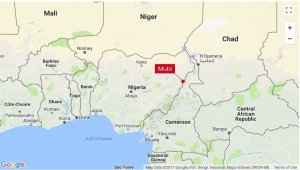At least 50 people were killed on Tuesday in a suicide bomb attack at a mosque in northern Nigeria on the border with Cameroon, police told CNN.

The attack happened in the town of Mubi in Adamawa State as worshipers were gathering for the “fajr” dawn prayer at around 5:20 a.m. local time, said Othman Abubakar, a police spokesman.
The bomber was about 17 years old, Abubakar added.
Many more people were injured and taken to nearby hospitals.
So far no one has claimed responsibility for the attack, but over the past eight years, jihadist group Boko Haram has carried out hundreds of deadly attacks on mosques, schools, markets and churches in northern Nigeria.
Boko Haram, whose name translates roughly as “western education is forbidden,” frequently uses children to carry out the bombings.
Tuesday’s attack is the worst in a spate of suicide attacks in the Mubi area in recent months.
The inhabitants of the area are mainly subsistence farmers and herders from the Fulani tribe who trade at Mubi’s regionally prominent cattle market.
The town is near the Sambisa forest where Boko Haram fighters are believed to be hiding out, and where they took more than 270 schoolgirls they had kidnapped from a school in nearby Chibok in 2014, shocking the world.
Boko Haram briefly overran Mubi in 2014 before it was liberated by Nigerian soldiers.
“We have engaged all security agencies … take all necessary measures,” said the Adamawa state governor, Muhammad Jibrilla, on Twitter. “We call for calm as security has been stepped up in Mubi and environs. We will not rest until those behind this wicked act are brought to book. May the souls of the departed rest in peace.”
Tuesday’s attack comes a day after US Deputy Secretary of State John Sullivan made an official visit to Nigeria and promised $45 million in aid to the government to improve living conditions in the north of the country.
Since violence erupted in 2009, tens of thousands of people have been killed and more than two million have fled their homes, with 1.9 million internally displaced as of June 2017, according to the UN. More than 200,000 people are still in Cameroon, Chad and Niger, after having been forced to flee.
In the three most affected states of Borno, Adamawa and Yobe, almost 7 million people are in need of humanitarian assistance, more than 50% of whom are children.















